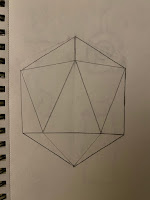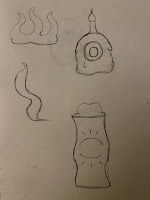Wednesday, April 26, 2023
Wooden Automata
Working with Wood
Before beginning the woodworking process, I sat down to sketch some abstract shapes. I did not have a direction in mind when sketching, however all of the sketches ended up very geometric rather than rounded, as well as having some sort of square or diamond in them. It reminded me of snake patterns as I drew and perhaps I had a snake pattern on my hands, which would impact how I decorated my final product.I made a mockup of the final design I chose out of balsa wood planks. It was at this point I had to decide my scale. I wanted to challenge myself, as this was the first project of the class and my first time making a wooden sculpture, so I chose to make it to scale. I measured how many inches the balsa wood pieces came out to and translated that into feet, which would transfer over to what size wood I cut.
Saturday, April 22, 2023
Working with Found Objects

Working with Mold Making
In a previous project, I had molded a pack of my dad's cigarettes out of clay. I wanted to attempt to now reproduce the cigarette portion of this piece, so I could then fill up a wooden box with reproduced cigarettes for a commentary on how the production of cigarettes can and ultimately kill you. However, this did not work out the way I intended it to.
Thursday, March 2, 2023
Working with Modeling
In Process
The object that I chose to model was my dad's pack of cigarettes. It is something I see everyday and without even touching it, I know the shape well. I am with my dad almost 24/7 and his smokes are always on him.
At the beginning of the process, I had a circular mound of clay. I rolled it out and pounded on all sides to make it into a box like shape, shaving off clay where I needed with tools. I decided to upscale the object for this project, so the cigarette pack is larger than the actual one.
After making the box, I measured out how long the cigarettes would be according to the upscale box. I didn't want them to be too skinny or too fat, so I had to hold them in between my fingers and make sure they didn't fall apart when I held them. I used a small plastic knife to make the ends clean cut as if a factory had rolled them out.
Final
Monday, February 20, 2023
Foam and Plaster Sculpture
 |
| The base of the sculpture. |
 |
| The sculpture without plaster. |
 |
| Beginning to plaster. |
 |
| Finishing the first coat of plaster. |
 |
| Reinforcing the base after two coats of plaster. |
Wooden Automata
I was inspired by an artist on Instagram named Amedeo Capelli who creates automatas to do this project. Before beginning, I wanted to pract...

-
One of the first things I thought of before I found anything for this project was the toothpaste cap city that Charlie Bucket built in the...
-
In Process The object that I chose to model was my dad's pack of cigarettes. It is something I see everyday and without even touching ...
-
I was inspired by an artist on Instagram named Amedeo Capelli who creates automatas to do this project. Before beginning, I wanted to pract...
















































